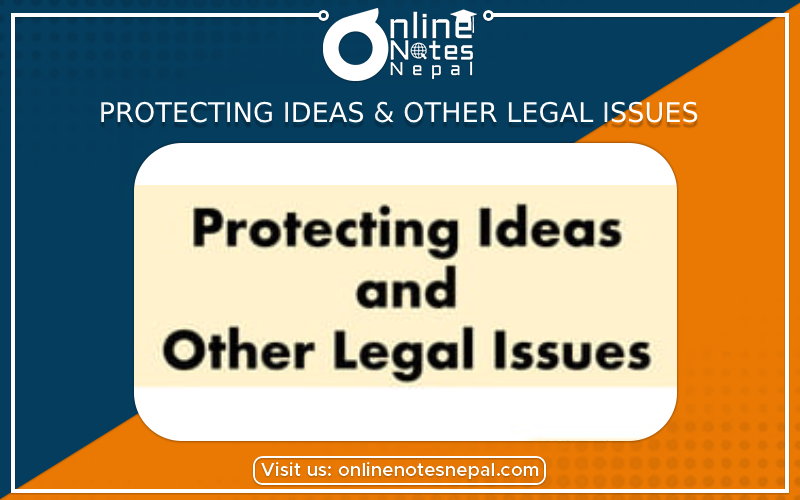Published by: Anu Poudeli
Published date: 21 Jul 2023

Individuals, businesses, and artists in a variety of professions must consider ideas protection and other legal challenges. Understanding how to secure your intellectual property and handle legal obstacles is critical to securing your work and inventions, whether you're an entrepreneur, an artist, a writer, or an inventor. I'll present an overview of some essential subjects connected to intellectual property and other legal challenges below:
Intellectual Property (IP) Fundamentals:
Inventions, literary and artistic works, designs, symbols, names, and pictures utilized in commerce are examples of intellectual property. Intellectual property protection is classified into four categories:
a. Patents: Patents grant inventors temporary exclusive rights to their innovations. Patents are used to protect new, useful, and non-obvious ideas and can be either utility patents (for processes, machinery, etc.) or design patents (for ornamental designs of functional things).
b. Copyrights: These safeguard original works of authorship, such as books, music, artwork, software, and other forms of creative expression. When qualified works are created, they are automatically granted copyright.
c. Trademarks: Protect brand names, logos, slogans, and other distinguishing marks in the marketplace that identify goods or services.
d. Trade Secrets: Confidential and valuable business information (for example, formulas, methods, and client lists) that is not publicly revealed but provides a competitive advantage.
Patent Protection:
Applying for a patent is a complicated process that requires legal documentation, technical specifics, and a full understanding of prior art (previous inventions in the field). Working with a patent attorney is essential for ensuring that your innovation fits the patentability criteria and navigating the patent application process.
Copyrights :
Copyright protection is automatic upon creation, but registering your copyright with the relevant copyright office (e.g., the United States Copyright Office) provides extra benefits, such as the power to suit for statutory damages and attorney's fees in the event of infringement.
Trademark Protection:
Registering a trademark with the relevant governmental body (e.g., the United States Patent and Trademark Office) increases your legal protection and helps prevent others in your field from using confusingly similar marks.
Trade Secret Protection:
Businesses must take reasonable precautions to keep information confidential in order to preserve trade secret protection. This frequently entails putting in place internal regulations, contracts, and restricting access to information.
Non-Disclosure Agreements (NDAs):
Non-disclosure agreements (NDAs) are legal contracts that are used to protect sensitive information and maintain confidentiality while releasing ideas, trade secrets, or other intellectual information to other parties.
Contracts and Licensing:
Licensing agreements enable individuals or businesses to grant or receive rights to utilize their intellectual property on certain terms and circumstances. Contracts that are properly designed are critical for describing these arrangements and preserving the interests of all parties involved.
Infringement and Enforcement:
If someone breaches your intellectual property rights, you may need to take legal action to enforce those rights. This may entail issuing cease-and-desist letters.
International Considerations:
Intellectual property protection varies greatly between countries. Understanding international treaties and seeking protection in applicable jurisdictions is critical for global businesses.
Fair Use and Exceptions:
Under certain conditions, use of copyrighted content may be permissible under the doctrine of "fair use" for purposes such as criticism, commentary, news reporting, education, or research. Fair use is critical for content providers and educators to understand.
It's crucial to remember that legal issues can be complicated and vary depending on where you live. Always speak with knowledgeable legal practitioners who specialize in intellectual property law when it comes to protecting your ideas and intellectual property. This overview serves as a starting point, but it is not legal advice.